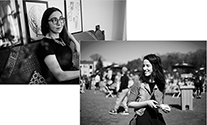 Daughters of Diaspora: two Algerian sisters, one in Texas, one in Paris
Daughters of Diaspora: two Algerian sisters, one in Texas, one in Paris
MAY 17, 2015
Djida waited until just before they left their home in Algiers to tell her 10-year-old daughter, Nada, that they were going to a new life in France.
You can take one thing with you, she told her. A neighbor, a police officer, was waiting in his car to ensure they made it to the airport safely.
It was June 18, 1994, and Algeria was in the third year of what would become known as the Black Decade, a savage civil war that broke out after the government invalidated elections set to be won by the Front of Islamic Salvation. While the government would eventually win the war, the death toll mounted to more than 150,000 civilians.
Women had become easy prey in a battle of competing visions of what Algeria should be — observant or secular — and some were brutally killed for wearing the veil, while others paid the same price for refusing it. [full story]
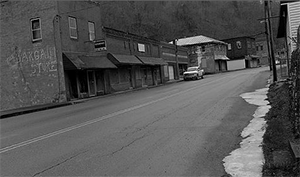 A Foggy Future in Coal Country
A Foggy Future in Coal Country
FEB 13, 2015
WHITESVILLE, W. Va. — Only minutes after turning off Interstate 64, cell service disappears and a world that seems untouched by time appears in the fog-covered valleys that unfold along sinuous Coal River Road.
There are none of the chain businesses that make towns across America look disconcertingly similar. The houses that dot the roadside were last updated long ago, and many of the arteries that branch off the main thoroughfare and into the hills above remain unpaved.
Though so much wealth has been extracted from these once coal-rich mountains, there are no visible traces of any windfall to the people or the land that made it possible. There is no sign that any thought was ever given in preparation for a day that could have been foreseen, a day when coal wouldn’t be king in the country’s choice of energy sources and when the people here wouldn’t be needed. [full story]
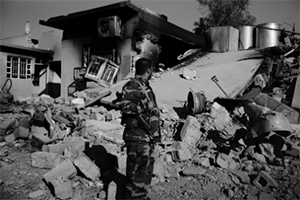 Neighbor Against Neighbor: Tracking the Exiles of Green Mosque Road in Kurdistan
Neighbor Against Neighbor: Tracking the Exiles of Green Mosque Road in Kurdistan
OCT 18, 2014
MAKHMOUR, Iraq — On this nameless street, colloquially known to residents only as Green Mosque Road, the high walls that line the sidewalks make each house a compound unto itself, with only roofs and treetops visible to the outside. But behind these walls, neighbors say they shared their lives — weddings, funerals, holidays and meals — and lived as one family.
The Kurdish Mohsens and the Arab Mareis, whose houses are at opposite ends of their block, broke bread together for years, whether in their homes or on picnics in the cooler mountains above their town, some 60 miles south of Mosul. Mohammed Mohsen, 20, remembers that at their last outing in the spring, they laughed endlessly over a generous feast — though the Mareis’ cooking was never quite as good as his mother’s.
But a few days after the town of Makhmour was liberated from the forces of the Islamic State of Iraq and the Levant (ISIL), an angry mob came to set fire to the empty Marei house. [full story]
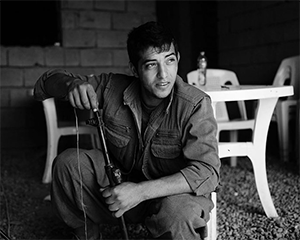 After repelling ISIL, PKK fighters are the new heroes of Kurdistan
After repelling ISIL, PKK fighters are the new heroes of Kurdistan
OCT 17, 2014
ERBIL, Iraq — The body of Zanyar Kawa is making its final journey to Sulaymaniyah, in northeastern Iraq. The slain fighter died 500 miles from his hometown battling the Islamic State of Iraq and the Levant, or ISIL, in Kobane, a Syrian town near the Turkish border.
Though an Iraqi Kurd, Kawa did not die serving the Iraqi Kurdish security forces, known as the peshmerga. Rather, he was killed fighting alongside guerrillas associated with the Kurdistan Workers’ Party, or PKK, which seeks self-determination for Kurds in Turkey and across the region. Both Turkey and the United States consider the PKK a terrorist organization.
Nearly a hundred people have gathered on a grassy plaza in the city’s center to receive Kawa’s body and accompany it home. PKK flags are flying, along with banners of Abdullah Öcalan, the group’s founder. While most in the crowd are Turkish Kurds who live in exile, there are Iraqi Kurds, too. [full story]
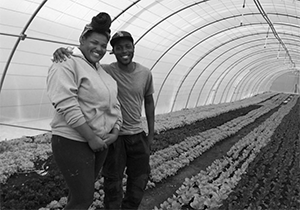 Urban green: Hoop houses replace rowhouses in Baltimore’s Sandtown
Urban green: Hoop houses replace rowhouses in Baltimore’s Sandtown
MAY 18, 2014
Baltimore, MD -- In Sandtown, Douglas Wheeler looks out with satisfaction over the abandoned city block turned farm where he works growing all sorts of greens and lettuce — “but never iceberg” — and remembers how it used to be.“This lot was a garden of trash,” he says. “With rats all over the place.”Before they were demolished in 2005, the block had 27 rowhouses, most of them long boarded up and abandoned, transformed from icons of Baltimore pride to casualties of the blight brought on the city by deindustrialization, unemployment, addiction and the war on drugs. [full story]
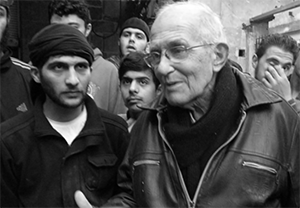 Ravaged by war, Syrians mourn the slain father of Homs
Ravaged by war, Syrians mourn the slain father of Homs
APR 7, 2014
After three years of civil war, during which brutal killing has become commonplace, many Syrians were left stunned Monday by the murder of a Dutch Jesuit priest gunned down in Homs, the besieged city that had been his home since the mid-1960s and which he refused to abandon, even as it came under heavy attack and its residents starved.
Francis Van Der Lugt, or Abouna (father) Frans as he was known to Syrians, touched the lives of many, not only Christians. A Jesuit, he belonged to the same order as Pope Francis, and his impact was felt far beyond the doors of the monastery where he ministered. His initiatives “Al Ard” (The Land) and “Al Maseer” (The Path) introduced many Syrians to each other and to their country — often for the first time. His steadfast commitment to providing relief to all Syrians in a time when he could have easily escaped the country as it descended into its current abyss, earned him wide respect and love. [full story]
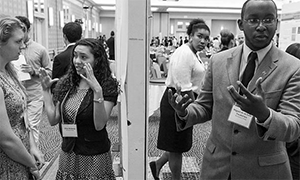 ‘You don’t look like a math major’
‘You don’t look like a math major’
AUG 21, 2013
CAMBRIDGE, Mass. — On the blackboard in this MIT classroom, a list of positives and negatives are represented not with pluses and minuses but with pluses and deltas. The Greek letter here stands for “change,” as it does in myriad formulas familiar to these undergraduate students of science, technology, engineering and mathematics (STEM).
The distinction in symbols comes from a spirit that favors momentum to inertia, because here — where the ultimate goal is innovation — an outcome that isn’t positive needn’t be final or permanent.
The two graduate students who serve as advisers to this group of 11, POD 2, are leading them through a call-out session where everyone must share something good and something that needs to be changed from their past week as summer research interns. A young woman records the running tally. [full story]
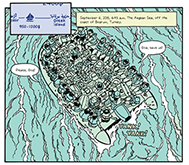 The Road to Germany : $2400
The Road to Germany : $2400
JAN/FEB 2016
Each of the millions of Syrian refugees who have fled their brutalized, unrecognizable homeland did so for uniquely personal reasons — the regime bombarding cities, the Islamic State threatening a return to the dark ages, the loss of jobs in a crumbling economy. Yet their quests cohered around one purpose: They all wanted better lives.
Some set out on a complicated journey to Europe with a crude graphic — a flowchart of the route from Turkey to Germany — as a guide. In its rudimentary geometry, refugees saw an impossible dream. In its illustrated stick figures, kicking their heels upon reaching the final destination, they saw themselves. They allowed an image, powerful and meditative in its simplicity, to shape their personal stories.
FP has done the same. In the following story, the odyssey of several refugees — men, women, and children — is presented in the form of a nonfiction comic. Each panel is based on firsthand reporting gathered by journalist Alia Malek: [full story]
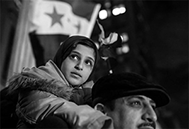 FOR SYRIAN-AMERICANS, THE TRAVEL BAN FEELS ALARMINGLY FAMILIAR
FOR SYRIAN-AMERICANS, THE TRAVEL BAN FEELS ALARMINGLY FAMILIAR
FEB 5, 2017
On Saturday morning, I woke up to a panicked message from my friend Kinan Azmeh, in Beirut. He wanted to know, “Do you think I can no longer go back to America?”
A virtuoso on the clarinet and a brilliant composer, Kinan was fresh from a concert in Germany where he had débuted his latest work with the cellist Yo-Yo Ma, with whom he tours as a member of the Silk Road ensemble. [full story]
Unlawful Detention on U.S. Soil
DEC 22, 2011
When his wfie and children arrived to visit Shukri Abu-Baker at the secretive federal prison known as a Communications Management Unit (CMU) in Terre Haute, Indiana, this past fall, they were forced to sit in silence and stare at him through Plexiglass. The twin phones on either side of the partition wouldn’t work. They raised their voices to be able to hear each other, but the guards immediately told them to stop. Their communications, after all, had to be recorded and monitored live by someone in Washington, DC.
The Abu-Bakers had scheduled their visit over a month in advance. The Federal Board of Prisons (BOP) knew they were coming. The family made the fifteen-hour trip from Dallas to Terre Haute in a rented van, spending a total of $2,000 so they could spend eight hours that weekend seeing and talking to Shukri. [full story]
Democracry 101 For Egypt
SEPT 12, 2011
Tonight’s class at the School for Politics, in the Egyptian Democratic Academy (EDA), focuses on socialism versus liberalism and the meaning of a civil state. The students are men and woman in their 20s or beyond, who’ve arrived at the end of their work or university day to spend the next four hours on a balcony turned classroom. The heat is only occasionally broken by a single rotating fan, and the noise from the traffic below is relentless. But no one seems to mind, and all eyes are on Esraa Nouh, the 25-year-old teacher. She wants to know: what have her students heard about liberalism? [full story]
GITMO in the Heartland
MAR 28, 2011
On the evening of May 13, 2008, Jenny Synan waited for a phone call from her husband, Daniel McGowan. An inmate at Sandstone, a federal prison in Minnesota, McGowan was serving a seven-year sentence for participating in two ecologically motivated arsons. It was their second wedding anniversary, their first with him behind bars. So far his incarceration hadn’t stopped him from calling her daily or surprising her with gifts for her birthday, Valentine’s Day and Christmas. But Jenny never got a call from Daniel that night—or the next day, or the next.
It was only days later that Jenny heard from a friend that Daniel was in transit, his destination Marion, Illinois. She quickly researched Marion and learned that it housed both a minimum- and a medium-security facility. Daniel, however, was classified as a low-security prisoner, a designation between minimum and medium. Even though he had a perfect record at Sandstone and had been recommended for a transfer to a prison closer to home, Jenny still didn’t think it was likely that Daniel would be stepped down to minimum security. But it made no sense that he would be moved up to medium security. [full story]
Invisible Arab-Americans
SEPT 23, 2010
In 1921 heartthrob Rudolph Valentino, starring in the black-and-white film The Sheik, introduced Americans via the big screen to the Arab—the progenitor of today’s loosely defined, hysteria-inducing, mosque-building, uppity enemy. In the movie, Arabs were portrayed as exotic, temperamental, prone to rape and having small hands.
Those were the good old days.
Today’s Islamophobic rapture, with its equally absurd extremes of Koran bonfires and public service announcements in which Muslims have to remind their fellow Americans that they are (good) Americans too, should not come as a surprise. Arabs and Muslims have a long history of being perceived and portrayed as utterly foreign to America. [full story]
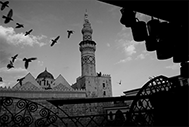 The Syria the World Forgot
The Syria the World Forgot
JUNE 8, 2013
LAST month, while we waited at the Lebanese border for our papers to be processed so that we could return to Syria, a woman traveling in our shared taxi pointed at the clouds gathering in the sky and said, “The Orthodox will be happy.”
She was referring to the annual contest between Syrian Catholics and Orthodox Christians — whose religious calendars diverge at Easter — that looks to meteorology to settle which church crucified and resurrected Jesus on the right weekend that year. The winning combo is a rainy Good Friday with a perfectly clear Easter Sunday. [full story]
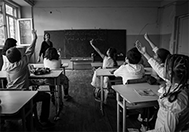 Armenians Fleeing Anew as Syria Erupts in Battle
Armenians Fleeing Anew as Syria Erupts in Battle
DEC 12, 2012
YEREVAN, Armenia — At the newly opened Cilician School in this former Soviet republic, the textbooks are in Arabic, photocopied from a single set flown out of war-torn Syria. The curriculum is Syrian, the flag on the principal’s desk is Syrian, and the teachers and students are all Syrians.
They are also ethnic Armenians, driven by Syria’s civil war to a notional motherland most barely know. [full story]
Syrian Arrests Are Said to Have Snared Tens of Thousands
JUNE 27, 2012
DAMASCUS, Syria — After Syrian secret police officers spotted Azam at a peaceful demonstration in the heart of this city, he said, they chased him down and dragged him off to prison, where he was tortured during his 40 days in confinement.
“They take people and forget them because there are so many others coming in,” said Azam, who asked to be identified by only his first name. He said he had been detained by air force security officers, members of one of more than a dozen secret police services in Syria.
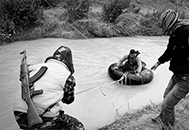 Syrians Defy Leaders to Aid Those in Need
Syrians Defy Leaders to Aid Those in Need
MAY 14, 2012
DAMASCUS, Syria — For 48 hours, the two Damascus residents struggled to reach the besieged city of Homs by car, trying to deliver boxes of blood bags so surgeons there could operate on the wounded. But gunfire made the roads impassable.
Finally, they strapped their contraband to their backs and, led by a shepherd through back roads and dirt paths, hiked 65 miles to the city.
As the violence across Syria reaches a treacherous new phase and the numbers of displaced and injured swell, such individual and ad hoc efforts have grown into an increasingly organized underground network of volunteers willing to brave injury and arrest to deliver relief supplies to those trapped, wounded or displaced by the fighting. [full story]
For Muslim New Yorkers, Final Rites That Fit
JAN 8, 2006
ERHAN YILDIRIM is singing in Arabic. His voice barely rises above the sound of the water that falls onto ceramic tiles after it spills over the lifeless body in front of him.
In mournful tones, Mr. Yildirim celebrates God -- "He is great, and there is no God but God" -- as he prepares yet another immigrant for a proper Muslim burial, one that will bring the man closer to his homeland than he has been in years.
On this late November day, Mr. Yildirim, who is trained to be an imam, then performs the man's last ablution. It is the same ritual that every Muslim performs in life before prayer: washing the feet, hands and face. Mr. Yildirim then washes the entire body with olive oil soap before fetching a pure cotton shroud and wrapping it around the naked body like a cocoon.[full story]
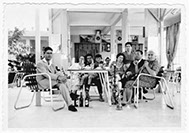 Enduring Exile
Enduring Exile
OCT 14, 2013
Two years ago, in September, Anto’s neighbors warned him: it was time for him to go. He would no longer be safe in these hills above the city of Idlib in northwestern Syria. He knew better than to doubt them.
A descendant of Armenians from Ottoman Turkey, he had inherited a dormant vigilance that now came to life. Anto’s father used to tell him, repeating what had been passed down through four generations: “Like we came from Turkey, we may also one day leave from Syria.”
With his neighbors’ warnings in his ears, Anto scrambled to secure some cash. He started to quietly sell off whatever he could from Abu Artin, a restaurant and inn that his family had operated every spring and summer since 1938. His grandfather had built Abu Artin, named for Anto’s great-grandfather, high in these hills as an escape for Syrians living in the swelter of those months in the cities and towns below. The land offered fresh air, their kitchen delectable food, and the men—Anto and his father and grandfather before him—impromptu musical performances that had made them famous with customers. [full story]
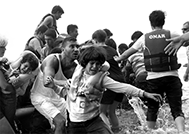 In Rebuke of Forgetfulness
In Rebuke of Forgetfulness
JUNE 8, 2013
By now, this should all be rather familiar, we’ve been here so many times before: where there is war, displacement always follows.
Similarly, we should all know that as much as these are destructive forces, they are also integral in shaping the makeup of the many societies they touch, no matter how these countries emerge in the after – whether in triumph or defeat. And no one is really untouched. Most nations that we take for granted as cohesive today were themselves products of demographic shifts and movements, often as a result of conflict – either within their borders or from without. [full story]
AJAM
Foreign Policy
The New Yorker
The Nation
New York Times
Guernica
Magnum Photos
design and hosting by noumenon designs
© 2017 Alia Malek